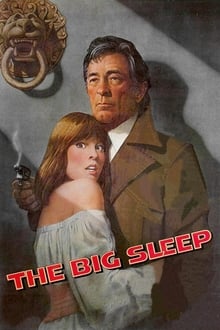
A remake that neither won me nor convinced me.
When I saw the original film, with Bogart and Bacall, from 1946, I was very pleased with the technical and artistic qualities, and also with the excellent acting by a top cast, but frankly sad with the script. I found that whole story very far-fetched and confusing, and I thought it would have been more fun to watch if the script had brought us something simpler, clearer and easier to follow, while maintaining the dose of mystery. This film is nothing more than a remake made thirty years later, and as such it is very difficult to resist making comparisons. I'm going to try to resist as long as I can and analyze this film for what it's worth.
For this production, director Michael Winner called for a strong cast headed by Robert Mitchum, a veteran actor who, however, did not seem inappropriate for this character who, in the original written material, is half his age. Philip Marlowe is an experienced, serious, suspicious private detective who has extensive knowledge of the criminal world and authorities, and if we consider all these characteristics, it seems sensible to call a middle-aged actor with charm and a heartthrob air. I also really liked James Stewart's work. I was surprised by the actor's frail and aged appearance, and even more surprised to see that he lived for another twenty years after the film was made. He was the right man for this job and shows his tenacity and love for his art. Candy Clark is as naughty and seductive as she can be, making her character a true nymphet. This seemed a bit extreme to my eyes, but considering it was the 70s and sex was selling like hotcakes, it makes some sense. Sara Miles is a frankly positive addition, while Oliver Reed seemed more neutral and dull to me. Richard Boone just does what he has to do, but what he does is done well.
On a technical level, I have some objections: if this is a kind of neo-noir, it doesn't seem at all unreasonable for them to use color cinematography instead of traditional black-and-white, but it seems to me that the second option would be more favorable to the construction of dramatic tension and suspense. This becomes even more legitimate if we consider that the color is quite faint and the luminosity is not beautiful, perhaps due to the choice of lens or a certain type of film material. I really like the filming locations and transferring the action to the United Kingdom allows the use of the country's large aristocratic mansions, as well as good street filming in quiet neighborhoods in London and other cities. The change of country, however, has more cons than pros: much of the story loses credibility outside the USA, where the circulation of weapons is more liberal and crime is different. The action scenes also seem out of place here, which is perhaps why they seem so bland and sleepy. I also didn't like the nude scenes, although the plot involved the illegal sale of pornographic material, something very much in keeping with the time in which the film was made.
Honestly, there isn't much to say about the script. The story is essentially the same as what we saw in the older film, with some more discreet variations and nuances. It continues to be a complicated plot to follow and where a lot happens in a relatively small amount of time, where a lot is said in a short time and involves too many characters and twists, in my opinion. They could have used the film to present a smoother version of the original story, but they decided not to do so.